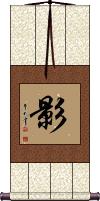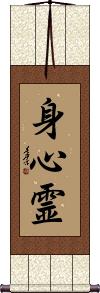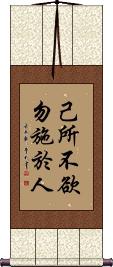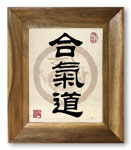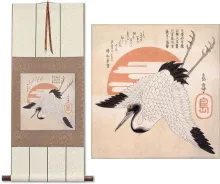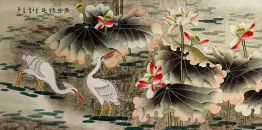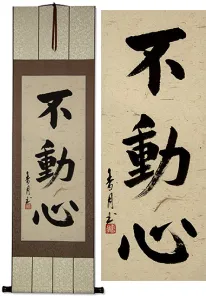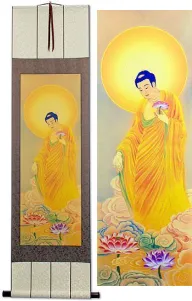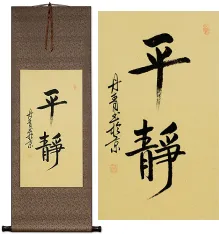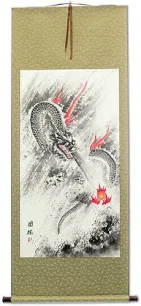Many custom options...
And formats...

Presence in Chinese / Japanese...
Buy a Presence calligraphy wall scroll here!
Personalize your custom “Presence” project by clicking the button next to your favorite “Presence” title below...
Presence of Mind
Presence of Mind
Heijoshin / Presence of Mind
平常心 is the title Heijoshin, as associated with Kendo and Aikido schools of Japanese martial arts.
平常心 is also a word in Japanese that can be translated as “one's self-possession” or “presence of mind.”
In Chinese and Korean, this means “simplicity heart,” “composure,” “calmness,” or a “sense of orderliness.” In Chinese and Korean, this implies that you enjoy what you have, keep your heart in balance, and have no over-blown ambitions.
Shadow
影 means shadow in Chinese, Japanese Kanji, and old Korean Hanja.
Depending on the context, this can also mean silhouette, reflection, image, or presence.
Great Illumination of Wisdom
Body Mind Spirit
身心霊 means “body mind spirit” in Japanese.
This refers to your physical, mental, and spiritual presence.
This can also be translated as “body heart spirit” as 心 can mean mind or heart.
Note that this is a "word list" and not a proper phrase (with a subject, verb, and object) nor a typical title in Japanese. So it's not too commonly seen in Japan. However, the term 身心霊整合性医療 that refers to holistic medicine is gaining popularity.
Confucius: Golden Rule / Ethic of Reciprocity
Do not do to others what you do not want done to yourself
Some may think of this as a “Christian trait,” but actually, it transcends many religions.
This Chinese teaching dates back to about 2,500 years ago in China. Confucius had always taught the belief in being benevolent (ren), but this idea was hard to grasp for some of his students, as benevolence could be kind-heartedness or an essence of humanity itself.
When answering Zhong Gong's question as to what "ren" actually meant, Confucius said:
己所不欲勿施于人 or "When you go out, you should behave as if you were in the presence of a distinguished guest; when people do favors for you, act as if a great sacrifice was made for you. Whatever you wouldn't like done to you, do not do that thing to others. Don't complain at work or home.”
Hearing this, Zhong Gong said humbly, “Although I am not clever, I will do what you say.”
From this encounter, the Chinese version of the “Golden Rule” or “Ethic of Reciprocity” came to be.
The characters you see above express, “Do not do to others whatever you do not want to be done to yourself.”
See Also: Confucius Teachings | Benevolence
This in-stock artwork might be what you are looking for, and ships right away...
Gallery Price: $96.00
Your Price: $52.88
Gallery Price: $200.00
Your Price: $98.88
Gallery Price: $60.00
Your Price: $36.88
Gallery Price: $340.00
Your Price: $188.88
Gallery Price: $200.00
Your Price: $118.88
Gallery Price: $200.00
Your Price: $69.88
Gallery Price: $79.00
Your Price: $43.88
Gallery Price: $31.00
Your Price: $16.88
Gallery Price: $300.00
Your Price: $138.88
Gallery Price: $200.00
Your Price: $118.88
These search terms might be related to Presence:
Advance Bravely / Indomitable Spirit
Alone / Solitary Existence
Alone With Only Your Shadow for Company
Aura
Beautiful Heart / Beautiful Spirit
Beautiful Spirit
Body Mind Spirit
Charisma / Charm
Courageous Spirit
Demon / Ghost / Apparition
Divine Spirit
Dragon Spirit
Esprit De Corps / Team Spirit
Fighting Spirit
Free Spirit
Fruit of the Spirit
Ghost / Apparition / Phantom
Ghost / Soul / Spirit
Ghost Demon
Ghost Warrior
Goddess of Beauty / Beautiful Spirit
Heart / Mind / Spirit
Heroic Spirit
Heroic Spirit / Great Ambition
Heroic Spirit / Heroism
Holy Spirit / Holy Ghost
Independent Spirit
Independent Spirit / Independent Heart
Indomitable Spirit
Indomitable Spirit / Indomitable Attitude
Inner Beauty / Beauty of Spirit
Inugami / Dog Spirit
Mind Body Spirit
Misery Loves Company
Old, but More Vigorous in Spirit
Purified Spirit / Enlightened Attitude
Soul / Spirit
Spirit
Spirit / Soul
Spirit / Spiritual Essence
Spirit of Taekwondo
Spirit of the Dragon Martial Arts
Spiritual Strength / Strength of Spirit
Taekwondo Tenets / Spirit of Taekwon-Do
The Aura of Buddha
The Spirit of Dragon and Tiger
The Spirit of the Dragon Horse
The Spirit of the Dragon Horse and Power of a Tiger
True Emptiness Yields Transcendent Existence
Warrior Essence / Warrior Spirit / Martial
Warrior Soul / Heroic Spirit
Warrior Soul / Spirit of a Fighter
Wolf Spirit / Soul of a Wolf
Not the results for presence that you were looking for?
Below are some entries from our dictionary that may match your presence search...
| Characters If shown, 2nd row is Simp. Chinese |
Pronunciation Romanization |
Simple Dictionary Definition |
冷静 see styles |
reisei / rese れいせい |
(noun or adjectival noun) calmness; composure; coolness; serenity; presence of mind |
平静 see styles |
heisei / hese へいせい |
(noun or adjectival noun) (1) calm; peace; serenity; tranquility; tranquillity; (noun or adjectival noun) (2) composure; equanimity; presence of mind |
迫力 see styles |
hakuryoku はくりょく |
More info & calligraphy: Gutsy / Daring / Bold |
平常心 see styles |
píng cháng xīn ping2 chang2 xin1 p`ing ch`ang hsin ping chang hsin heijoushin / hejoshin へいじょうしん |
More info & calligraphy: Heijoshin / Presence of Mindone's self-possession; one's presence of mind ordinary mind |
落着き see styles |
ochitsuki おちつき |
More info & calligraphy: Presence of Mind |
泰然自若 see styles |
tài rán zì ruò tai4 ran2 zi4 ruo4 t`ai jan tzu jo tai jan tzu jo taizenjijaku たいぜんじじゃく |
More info & calligraphy: Presence of Mind(adj-t,adv-to) (yoji) having presence of mind; self-possessed; imperturbable; calm and self-possessed |
前 see styles |
qián qian2 ch`ien chien misaki みさき |
front; forward; ahead; first; top (followed by a number); future; ago; before; BC (e.g. 前293年); former; formerly (1) in front (of); before (e.g. a building); (n,adj-no,adv) (2) before; earlier; previously; prior; ago; (minutes) to (the hour); (noun - becomes adjective with の) (3) (the) front; frontal part; fore; head (e.g. of a line); (4) forward; ahead; (5) (in the) presence (of); in front (of someone); (can be adjective with の) (6) previous (e.g. page); prior (e.g. engagement); first (e.g. half); former (e.g. example); (suffix) (7) (after a noun or the -masu stem of a verb) (See 一人前・1) portion; helping; (8) front (of one's body or clothing); breast (of a coat, kimono, etc.); (9) privates; private parts; (10) (colloquialism) criminal record; previous conviction; (a) prior; (personal name) Misaki pūrva. Before; former, previous; in front. |
在 see styles |
zài zai4 tsai mitsuru みつる |
to exist; to be alive; (of sb or something) to be (located) at; (used before a verb to indicate an action in progress) (1) the country; countryside; (2) outskirts; suburbs; (3) presence; being in attendance; (prefix) (4) (before a place name) situated in; staying in; resident in; (personal name) Mitsuru At, in, on, present. |
度 see styles |
duó duo2 to wataru わたる |
to estimate; Taiwan pr. [duo4] (n,n-suf) (1) degree (angle, temperature, scale, etc.); (counter) (2) counter for occurrences; (n,n-suf) (3) strength (of glasses); glasses prescription; (n,n-suf) (4) alcohol content (percentage); alcohol by volume; (5) (See 度を過ごす) extent; degree; limit; (6) (See 度を失う) presence of mind; composure; (given name) Wataru pāramitā, 波羅蜜; intp. by 渡 to ferry over; to save. The mortal life of reincarnations is the sea; nirvana is the other shore; v. pāramitā, 波. Also, to leave the world as a monk or nun, such is a 度得 or 度者. |
お前 see styles |
omee おめえ omae おまえ omai おまい |
(pn,adj-no) (1) (familiar language) (masculine speech) you (formerly honorific, now sometimes derog. term referring to an equal or inferior); (2) presence (of a god, nobleman, etc.); (pn,adj-no) (familiar language) (masculine speech) you (formerly honorific, now sometimes derog. term referring to an equal or inferior) |
一座 see styles |
yī zuò yi1 zuo4 i tso ichiza いちざ |
(1) the whole company; the party; all those present; everyone in attendance; (noun/participle) (2) attendance (at a gathering); presence; (3) banquet; dinner; party; (4) troupe; (theatrical) company; (5) (See 座・8) (one) statue; (6) (archaism) top seat; head (of the table) single seat |
不速 see styles |
bù sù bu4 su4 pu su fusoku |
uninvited (guest); unexpected (appearance); unwanted presence not fast |
人け see styles |
hitoke ひとけ |
(1) sign of life; human presence; (2) humanity; humaneness |
人影 see styles |
rén yǐng ren2 ying3 jen ying hitokage ひとかげ jinei / jine じんえい |
the shadow of a human figure; a trace of a person's presence (usu. combined with a negative verb) (1) figure of a person; figures of people; (2) shadow of a person |
佛前 see styles |
fó qián fo2 qian2 fo ch`ien fo chien butsuzen |
presence of the Buddha |
候駕 候驾 see styles |
hòu jià hou4 jia4 hou chia |
to await (your) gracious presence |
光来 see styles |
reira / rera れいら |
your visit (presence); (female given name) Reira |
光臨 光临 see styles |
guāng lín guang1 lin2 kuang lin kourin / korin こうりん |
(formal) to honor with one's presence; to attend (honorific or respectful language) (See 降臨・2) arrival; visit; call |
出勤 see styles |
chū qín chu1 qin2 ch`u ch`in chu chin shukkin しゅっきん |
to go to work; to be present (at work, school etc); to be away on business (n,vs,vi) (See 退勤) going to work; leaving for work; attendance (at work); being at work; presence (in the office); reporting for work |
出席 see styles |
chū xí chu1 xi2 ch`u hsi chu hsi shusseki しゅっせき |
to attend; to participate; present (n,vs,vi) (ant: 欠席) attendance; presence; appearance |
出頭 出头 see styles |
chū tóu chu1 tou2 ch`u t`ou chu tou dedou / dedo でどう |
to get out of a predicament; to stick out; to take the initiative; remaining odd fraction after a division; a little more than (n,vs,vi) (1) appearance; presence; attendance; (n,vs,vi) (2) surrender (e.g. to the police); turning oneself in; (surname) Dedou to appear |
列席 see styles |
liè xí lie4 xi2 lieh hsi resseki れっせき |
to attend a meeting as a nonvoting delegate (n,vs,vi) attendance; presence |
列座 see styles |
retsuza れつざ |
(noun/participle) attendance; presence |
参列 see styles |
sanretsu さんれつ |
(n,vs,vi) attendance; participation; presence |
圧し see styles |
oshi おし |
weight; pressing down; commanding presence; authority |
多寶 多宝 see styles |
duō bǎo duo1 bao3 to pao Tahō |
(多寳) (多寳如來, 多寶如來) Prabhūtaratna, abundant treasures, or many jewels. The Ancient Buddha, long in nirvana, who appears in his stūpa to hear the Buddha preach the Lotus doctrine, by his presence revealing, inter alia, that nirvana is not annihilation, and that the Lotus doctrine is the Buddha-gospel; v. Lotus Sutra 寳塔品. |
大前 see styles |
daizen だいぜん |
presence (of a god, emperor, etc.); (surname) Daizen |
威儀 威仪 see styles |
wēi yí wei1 yi2 wei i igi いぎ |
majestic presence; awe-inspiring manner dignity; majesty; dignified manner Respect-inspiring deportment; dignity, i.e. in walking, standing, sitting, lying. There are said to be 3,000 and also 8,000 forms of such deportment. |
存在 see styles |
cún zài cun2 zai4 ts`un tsai tsun tsai sonzai そんざい |
to exist; to be; existence (n,vs,vi) existence; being; presence to exist |
御前 see styles |
gozen; goze; mimae ごぜん; ごぜ; みまえ |
(1) (See おまえ・2) presence (of a nobleman, the emperor, etc.); (2) (See 前駆・1) outrider (person riding horseback in the lead position of a cavalcade); (n,n-suf) (3) My Lord; My Lady; (surname) Mimae |
Click here for more presence results from our dictionary
The following table may be helpful for those studying Chinese or Japanese...
| Title | Characters | Romaji (Romanized Japanese) | Various forms of Romanized Chinese | |
| Presence of Mind | 落着き | ochitsuki | ||
| Presence of Mind | 泰然自若 | taizenjijaku | tài rán zì ruò tai4 ran2 zi4 ruo4 tai ran zi ruo tairanziruo | t`ai jan tzu jo taijantzujo tai jan tzu jo |
| Heijoshin Presence of Mind | 平常心 | hei jou shin heijoushin hei jo shin | píng cháng xīn ping2 chang2 xin1 ping chang xin pingchangxin | p`ing ch`ang hsin pingchanghsin ping chang hsin |
| Shadow | 影 | kage | yǐng / ying3 / ying | |
| Great Illumination of Wisdom | 大智明 | dai chi myou daichimyou dai chi myo | dà zhì míng da4 zhi4 ming2 da zhi ming dazhiming | ta chih ming tachihming |
| Body Mind Spirit | 身心霊 | mi shin rei mishinrei | ||
| Confucius: Golden Rule Ethic of Reciprocity | 己所不欲勿施於人 己所不欲勿施于人 | jǐ suǒ bú yù wù shī yú rén ji3 suo3 bu2 yu4, wu4 shi1 yu2 ren2 ji suo bu yu, wu shi yu ren jisuobuyu,wushiyuren | chi so pu yü, wu shih yü jen chisopuyü,wushihyüjen |
|
| In some entries above you will see that characters have different versions above and below a line. In these cases, the characters above the line are Traditional Chinese, while the ones below are Simplified Chinese. | ||||
Successful Chinese Character and Japanese Kanji calligraphy searches within the last few hours...



